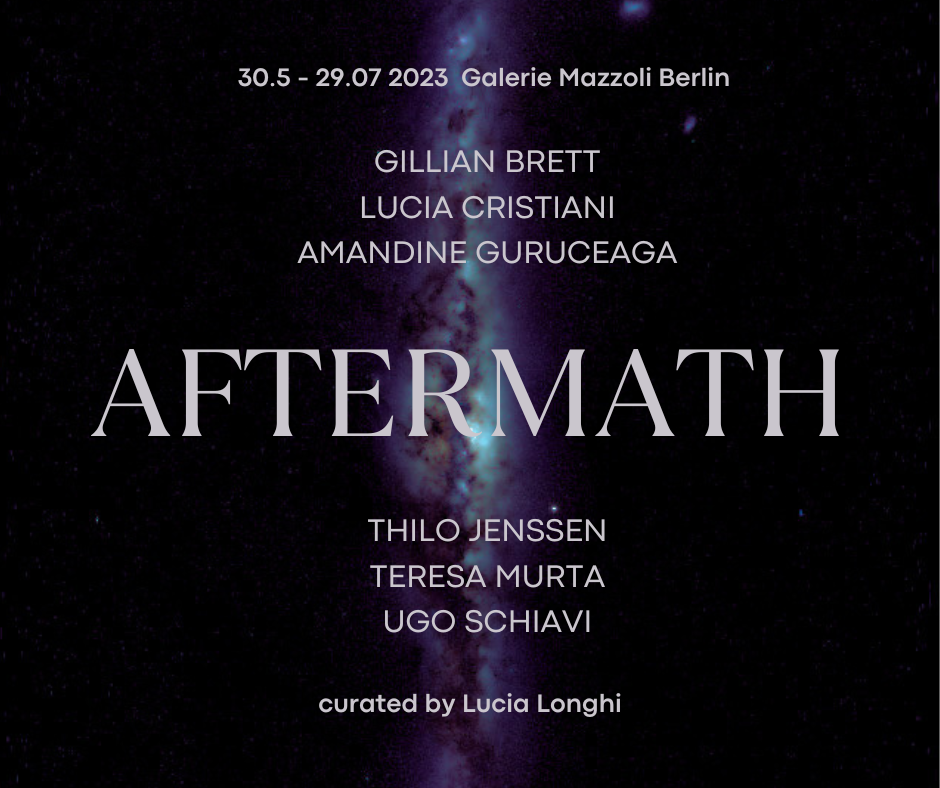
May 27th - July 29th, 2023
Aftermath // Gillian Brett, Lucia Cristiani, Amandine Guruceaga, Thilo Jenssen, Teresa Murta, Ugo Schiavi
Galerie Mazzoli / Eberswalder Str. 30, Berlin
Gillian Brett (Paris, France, 1990), Lucia Cristiani (Milan, Italy, 1991), Amandine Guruceaga (Toulouse, France, 1989),
Thilo Jenssen (Daun, Germany, 1984), Teresa Murta (Lisbon, Portugal, 1993), Ugo Schiavi (Paris, 1987).
PRESS RELEASE
Galerie Mazzoli Berlin is pleased to present Aftermath, a group show featuring artists Gillian Brett, Lucia Cristiani,
Amandine Guruceaga, Thilo Jenssen, Teresa Murta, Ugo Schiavi, curated by Lucia Longhi.
The project has surfaced as an exploration of the concept of aftermath. Etymologically anchored in
ancient roots - it refers to the mowing of fields - the term aftermath delves into notions of consequence
and outcome. The show borrows its title from a poem by H.W. Longfellow (1873): while suggesting
that what we destroy may never grow back as it was, it also hints at the possibility of a new beginning.
A sentence by JJ Charlesworth served as further input: “Art is often not made until the aftermath, by
those who survived or were far away. It’s this distance – of both time and place – that produces the
tensions at the heart of art’s response to human catastrophes”. This statement emphasizes the separation
between a crisis and its consequences, and positions artistic production at a certain distance from
traumatic events.
The exhibition aims at questioning this division, illuminating artistic approaches which operate within
the aftermath as a prolonged state of existence, rather than a transitory moment of recovery.
Given the current global situation, in which the repercussions of urgent realities of pandemics,
climate crisis and wars seem to be indefinitely protracted, is it still possible to operate a distinction
between a “before” and an “after”? We came to terms with a new dimension, a never ending limbo
which leads to a constant state of evolution and adjustment. We are adapting our bodies and our
collective thinking to new modes of existence.
Thus, the aftermath turns into a fertile space of self-consciousness and imagination; a perpetual training
for the present; a set of safety mechanisms; a laboratory to reforge our very flesh and merge with other
elements. In this context, most of today's art reveals an urge of looking for some "otherness", a longing
for a different - inner and outer, real or fictional - environment to inhabit.
Our life is punctuated by moments of hope and anxiety, control and release. Thilo Jenssen seems to
suggest that the aftermath already resides within us, guiding our actions long before any emergency
arises: we strengthen ourselves through rules and protocols. In the Screenshot-paintings, screen locks
and alarms depict strategies of security and self-regulation. The Blechpaintings ironically imply that the
separation between support and dominance is blurred: through details of first aid illustrations, Jenssen
plays with the resemblance of acts of assistance and bondage practices. The vibrant colors evoke an
idyllic landscape, reflecting a relentless pursuit of balance, while scratches and burns on the coatings
recall violent changes and obsessive gestures, like swiping on our smartphone.
The vocabulary of Amandine Guruceaga also includes burns and scrapes, symbolizing the marks of
time and trauma, thus turning the Healing Surfaces into symbols of resistance and regeneration. In a
time in which surface (understood as skin, bark, screen) is synonymous with armor, Guruceaga depicts
surfaces as platforms for an ongoing healing process, and windows to a new world.
Gates to otherworldly realms appear also within Gillian Brett's compositions. Through drilling,
scratching, and burning computer screens, Brett performs an autopsy to the body of electronic waste,
unearthing a new cosmos, simultaneously natural and anthropogenic. Delving into the essence of
technology, the After Hubble series unveils its role as both a beacon of progress and uncontrolled
wasteland.
The process of hybridization as an act of resistance and speculation is a threadline also in the
creations of Ugo Schiavi, Lucia Cristiani and Teresa Murta. Ugo Schiavi merges past, present and
future, tracing potential evolutionary horizons for our species. Fossils, archeological findings and human
waste blend to form hybrid creatures who speak to a dystopian future. Borrowing effigies from history,
these chimeras (Sentinelle, Fossil Memory #2 and Gorgone) bear traces of mutations, as if to adapt to a
multitude of alternative scenarios. By unearthing ancestral fears and exposing the failures of a resourceconsuming
society, Schiavi crafts a new mythology in which technology acts as a fossilizing agent.
's works also present bizarre mutations: the elements composing The Toothless’s Club,
Zanne Fragili and Gummy Bones transcend their original purpose as prosthesis and corrective dental
tools, dissolving their functionality into uncanny hybridizations. The reference to teeth as an apparatus
for both self-defense and nourishment serves as a foundation to explore a parallel discourse that exposes
human fragilities. Teeth and tusks turn in fact into delicate ornaments and independent organisms
which reshape our identities amidst an ever-evolving state of existence.
Teresa Murta's paintings evoke a perpetual state of transformation and a predisposition to merge
with inner and outer elements. Enigmatic figures morph into surreal forms, and figuration
intermittently emerges in a landscape of dream-like substance. The artist indulges in an autonomous
process where the painting itself takes the lead in shaping new forms. While exploring memories and
feelings directly on the canvas, Murta participates in a self-generating ecosystem of absurd realities.
Through different formal and conceptual lenses, the exhibited artists advocate a conscious experience of
the ongoing collision, for it allows us to renew our matter. Aftermath is a prism through which we are
invited to read our contemporaneity.
by Lucia Longhi
 May 27th - July 29th, 2023
May 27th - July 29th, 2023